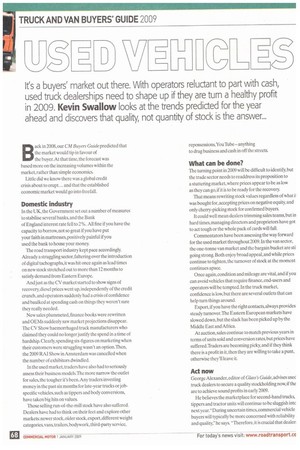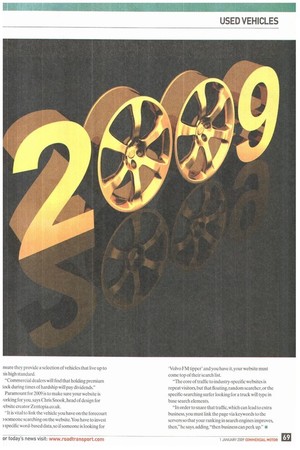It's a buyers' market out there. With operators reluctant to
Page 68

Page 69

If you've noticed an error in this article please click here to report it so we can fix it.
part with cash, used truck dealerships need to shape up if they are turn a healthy profit in 2009. Kevin Swallow looks at the trends predicted for the year ahead and discovers that quality, not quantity of stock is the answer...
Back in 2008, our CM Buyers Guide predicted that the market would tip in favour of the buyer. At that time, the forecast was based more on the increasing volumes within the market, rather than simple economics Little did we know there was a global credit crisis about to erupt... and that the established economic market would go into freefall.
Domestic industry
In the UK, the Government set out a number of measures to stabilise several banks, and the Bank of England interest rate fell to 2%. All fine if you have the capacity to borrow, not so great if you have put your faith in mattresses, positively painful if you used the bank to house your money.
The road transport industry kept pace accordingly. Already a struggling sector,faltering over the introduction of digital tachographs, it was hit once again as lead times on new stock stretched out to more than 12 months to satisfy demand from Eastern Europe.
And just as the CV market started to show signs of recovery, diesel prices went up, independently of the credit crunch, and operators suddenly had a crisis of confidence and baulked at spending cash on things they weren't sure they really needed.
New sales plummeted, finance books were rewritten and OEMs suddenly saw market projections disappear. The CV Show haemorrhaged truck manufacturers who claimed they could no longer justify the spend in a time of hardship. Clearly, spending six-figures on marketing when their customers were struggling wasn't an option:Then, the 2009 RAI Show in Amsterdam was cancelled when the number of exhibitors dwindled.
In the used market, traders have also had to seriously assess their business models:The more narrow the outlet for sales, the tougher it's been. Any traders investing money in the past six months for late-year trucks or j obspecific vehicles, such as tippers and body conversions, have taken big hits on value& Those selling run-of-the-mill stock have also suffered. Dealers have had to think on their feet and explore other markets: newer stock, older stock, export,different weight categories, vans, trailers, bodywork, third-party service, repossessions,You Tube — anything to drag business and cash in off the street&
What can be done?
The turning point in 2009 will be difficult to identify, but the trade sector needs to readdress its proposition to a stuttering market, where prices appear to be as low as they can go, if it is to be ready for the recovery That means rewriting stock values regardless of what ii was bought for, accepting prices on negative equity, and only cherry-picking stock for confirmed buyers It could well mean dealers trimming sales teams, but in hard times, managing directors and proprietors have got to act tough or the whole pack of cards will fall.
Commentators have been assessing the way forward for the used market throughout 2009. In the van sector, the one-tonne van market and the bargain bucket are stil going strong. Both enjoy broad appeal, and while prices continue to tighten, the turnover of stock at the moment continues apace.
Once again, condition and mileage are vital, and if you can avoid vehicles that require finance, end-users and operators will be tempted. In the truck market, confidence is low, but there are several outlets that can help turn things around.
Export, if you have the right contacts, always provides steady tumover.The Eastern European markets have slowed down, but the slack has been picked up by the Middle East and Africa.
At auction, sales continue to match previous years in terms of units sold and conversion rates,but prices have suffered.Traders are becoming picky, and if they think there is a profit in it, then they are willing to take a punt, otherwise they'll leave it.
Act now
George Alexander, editor of Glass's Guide, advises usec truck dealers to secure a quality stockholding now, if the are to achieve sound profits in early 2009.
He believes the marketplace for second-hand trucks, tippers and tractor units will continue to be sluggish intc next year. "During uncertain times, commercial vehicle buyers will typically be more concerned with reliability and quality," he says. "Therefore, it is crucial that dealer: nsure they provide a selection of vehicles that live up to -lis high standard.
"Commercial dealers will find that holding premium Lock during times of hardship will pay dividends." Paramount for 2009 is to make sure your website is /orking for you, says Chris Snook, head of design for rebsite creator Zentopia.co.uk.
"It is vital to link the vehicle you have on the forecourt ) someone searching on the website. You have to invest 1specific word-based data, so if someone is looking for 'Volvo FM tipper' and you have it, your website must come top of their search list.
"The core of traffic to industry-specific websites is repeat visitors, but that floating, random searcher, or the specific-searching surfer looking for a truck will type in base search elements.
"In order to snare that traffic, which can lead to extra business, you must link the page via keywords to the servers so that your ranking in search engines improves, then," he says, adding,"then business can perk up."












































































































































